University Healthcare: Reflection on Mental State Examination (MSE)
VerifiedAdded on 2022/12/27
|6
|1490
|1
Report
AI Summary
This report is a reflection on a video depicting a Mental State Examination (MSE) conducted on a patient experiencing low mood. The student analyzes the GP's approach, highlighting key components of the MSE such as rapport building, assessment of mood and affect, thought patterns, cognition, and insight. The report details the student's learning experience, focusing on how the GP gathered subjective and objective data to assess the patient's mental state, including the identification of symptoms associated with depression. The student evaluates the interview process, emphasizing the importance of specific questioning techniques to assess thought content, judgment, and insight. The analysis section discusses the MSE as a framework for accurate patient assessment, emphasizing the significance of each element, such as cognition and judgment. The report concludes with an action plan for future practice, focusing on documenting MSE findings, and a discussion on the importance of proper questioning skills in mental health diagnosis, treatment, and patient recovery. References to relevant literature are provided.
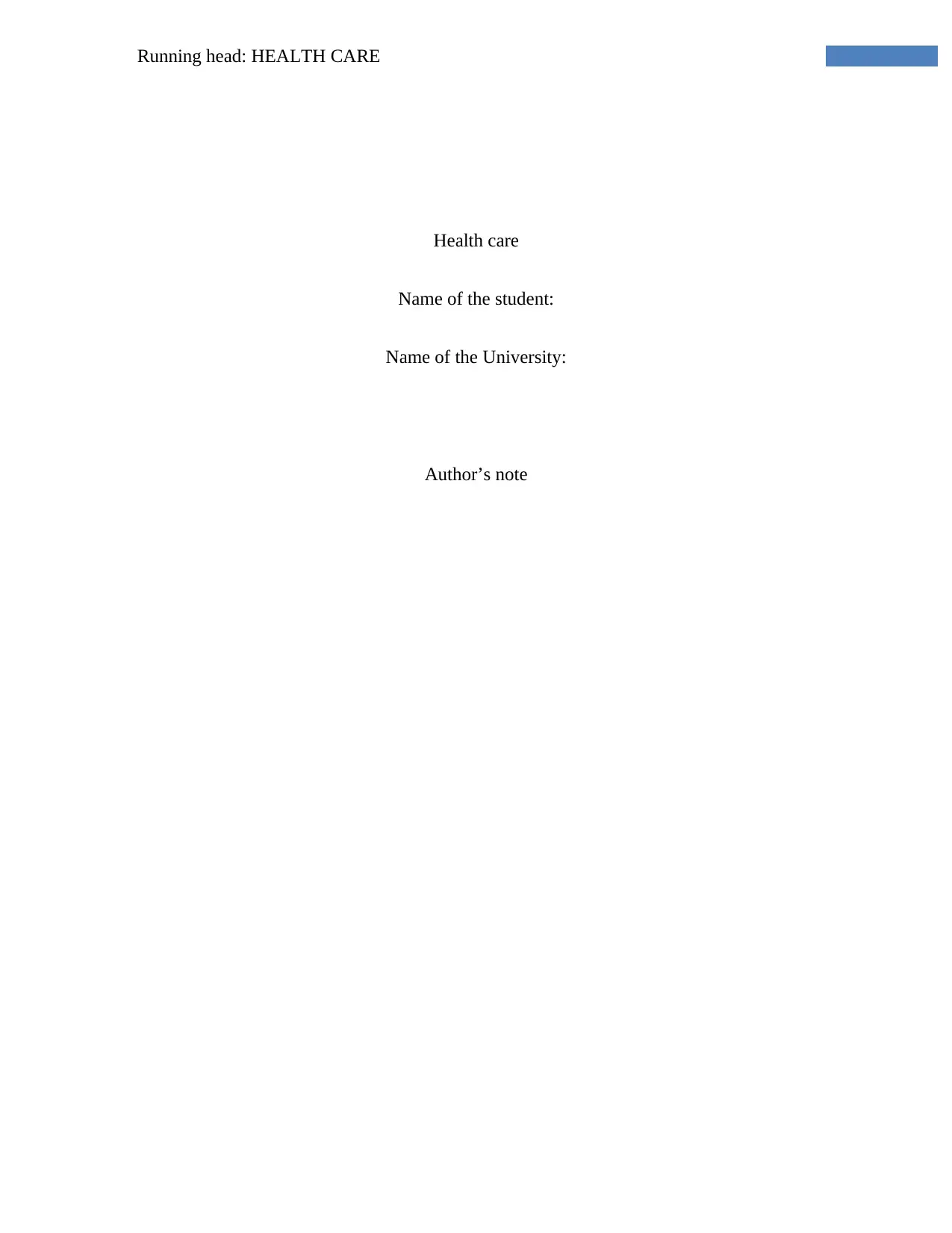
Running head: HEALTH CARE
Health care
Name of the student:
Name of the University:
Author’s note
Health care
Name of the student:
Name of the University:
Author’s note
Paraphrase This Document
Need a fresh take? Get an instant paraphrase of this document with our AI Paraphraser
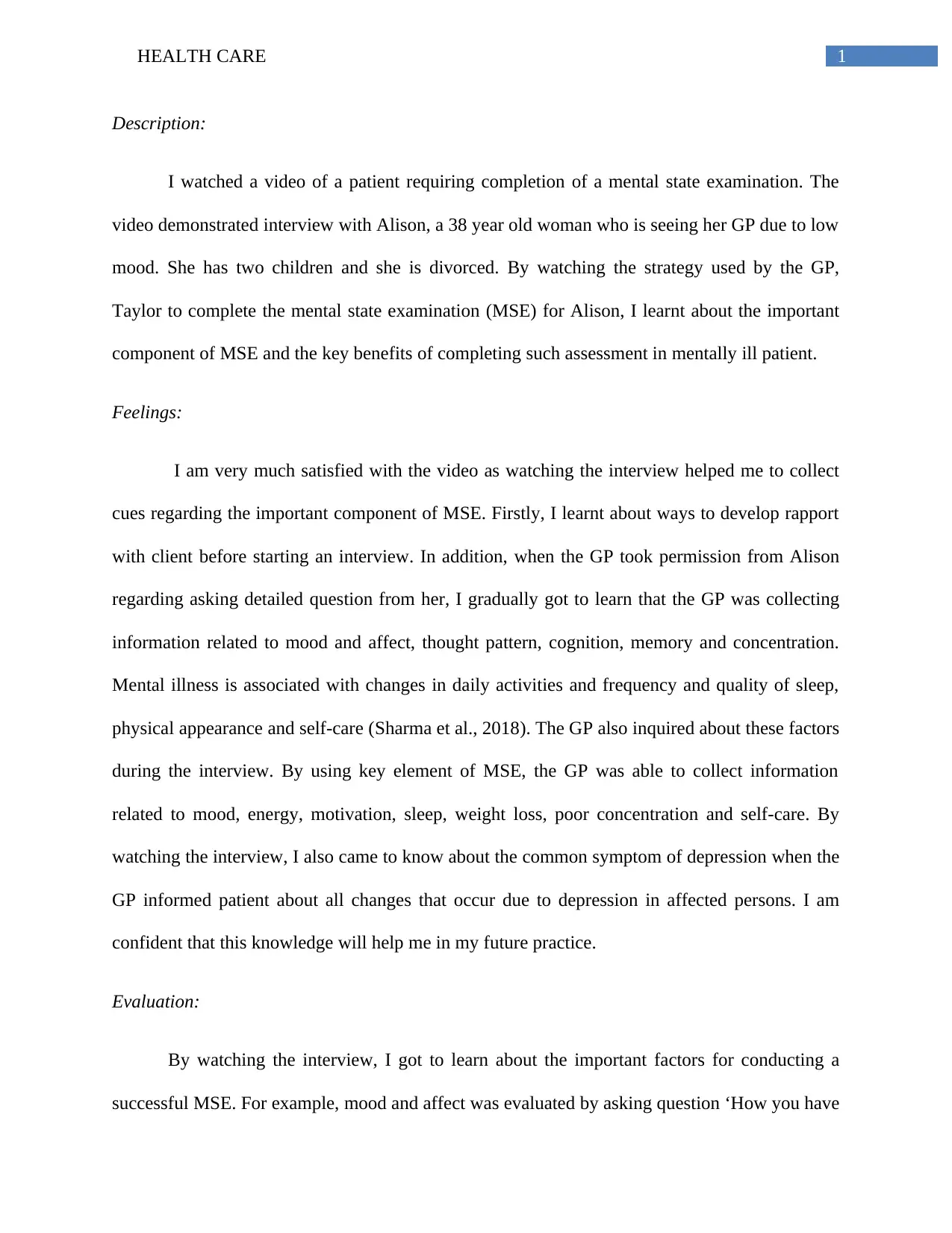
1HEALTH CARE
Description:
I watched a video of a patient requiring completion of a mental state examination. The
video demonstrated interview with Alison, a 38 year old woman who is seeing her GP due to low
mood. She has two children and she is divorced. By watching the strategy used by the GP,
Taylor to complete the mental state examination (MSE) for Alison, I learnt about the important
component of MSE and the key benefits of completing such assessment in mentally ill patient.
Feelings:
I am very much satisfied with the video as watching the interview helped me to collect
cues regarding the important component of MSE. Firstly, I learnt about ways to develop rapport
with client before starting an interview. In addition, when the GP took permission from Alison
regarding asking detailed question from her, I gradually got to learn that the GP was collecting
information related to mood and affect, thought pattern, cognition, memory and concentration.
Mental illness is associated with changes in daily activities and frequency and quality of sleep,
physical appearance and self-care (Sharma et al., 2018). The GP also inquired about these factors
during the interview. By using key element of MSE, the GP was able to collect information
related to mood, energy, motivation, sleep, weight loss, poor concentration and self-care. By
watching the interview, I also came to know about the common symptom of depression when the
GP informed patient about all changes that occur due to depression in affected persons. I am
confident that this knowledge will help me in my future practice.
Evaluation:
By watching the interview, I got to learn about the important factors for conducting a
successful MSE. For example, mood and affect was evaluated by asking question ‘How you have
Description:
I watched a video of a patient requiring completion of a mental state examination. The
video demonstrated interview with Alison, a 38 year old woman who is seeing her GP due to low
mood. She has two children and she is divorced. By watching the strategy used by the GP,
Taylor to complete the mental state examination (MSE) for Alison, I learnt about the important
component of MSE and the key benefits of completing such assessment in mentally ill patient.
Feelings:
I am very much satisfied with the video as watching the interview helped me to collect
cues regarding the important component of MSE. Firstly, I learnt about ways to develop rapport
with client before starting an interview. In addition, when the GP took permission from Alison
regarding asking detailed question from her, I gradually got to learn that the GP was collecting
information related to mood and affect, thought pattern, cognition, memory and concentration.
Mental illness is associated with changes in daily activities and frequency and quality of sleep,
physical appearance and self-care (Sharma et al., 2018). The GP also inquired about these factors
during the interview. By using key element of MSE, the GP was able to collect information
related to mood, energy, motivation, sleep, weight loss, poor concentration and self-care. By
watching the interview, I also came to know about the common symptom of depression when the
GP informed patient about all changes that occur due to depression in affected persons. I am
confident that this knowledge will help me in my future practice.
Evaluation:
By watching the interview, I got to learn about the important factors for conducting a
successful MSE. For example, mood and affect was evaluated by asking question ‘How you have
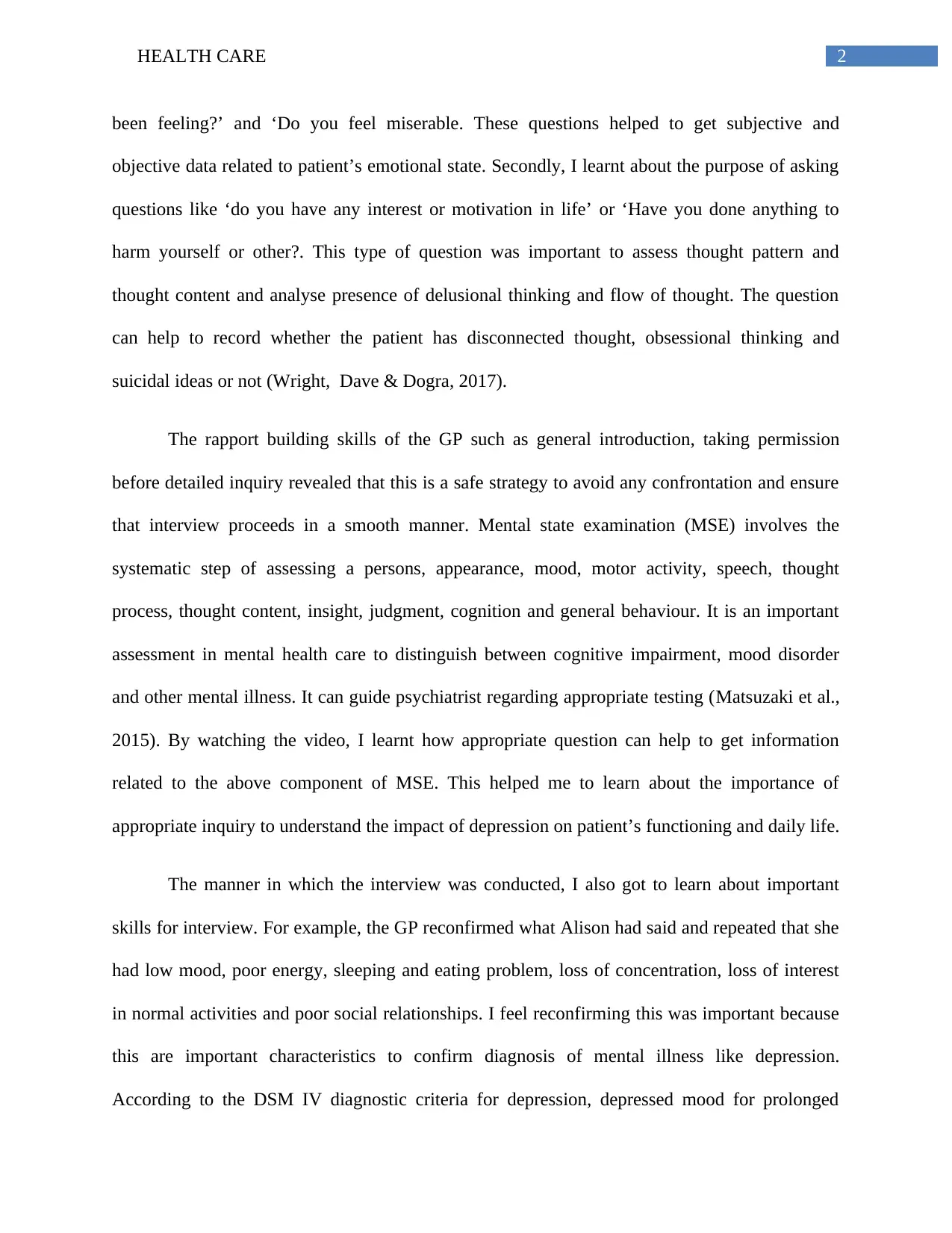
2HEALTH CARE
been feeling?’ and ‘Do you feel miserable. These questions helped to get subjective and
objective data related to patient’s emotional state. Secondly, I learnt about the purpose of asking
questions like ‘do you have any interest or motivation in life’ or ‘Have you done anything to
harm yourself or other?. This type of question was important to assess thought pattern and
thought content and analyse presence of delusional thinking and flow of thought. The question
can help to record whether the patient has disconnected thought, obsessional thinking and
suicidal ideas or not (Wright, Dave & Dogra, 2017).
The rapport building skills of the GP such as general introduction, taking permission
before detailed inquiry revealed that this is a safe strategy to avoid any confrontation and ensure
that interview proceeds in a smooth manner. Mental state examination (MSE) involves the
systematic step of assessing a persons, appearance, mood, motor activity, speech, thought
process, thought content, insight, judgment, cognition and general behaviour. It is an important
assessment in mental health care to distinguish between cognitive impairment, mood disorder
and other mental illness. It can guide psychiatrist regarding appropriate testing (Matsuzaki et al.,
2015). By watching the video, I learnt how appropriate question can help to get information
related to the above component of MSE. This helped me to learn about the importance of
appropriate inquiry to understand the impact of depression on patient’s functioning and daily life.
The manner in which the interview was conducted, I also got to learn about important
skills for interview. For example, the GP reconfirmed what Alison had said and repeated that she
had low mood, poor energy, sleeping and eating problem, loss of concentration, loss of interest
in normal activities and poor social relationships. I feel reconfirming this was important because
this are important characteristics to confirm diagnosis of mental illness like depression.
According to the DSM IV diagnostic criteria for depression, depressed mood for prolonged
been feeling?’ and ‘Do you feel miserable. These questions helped to get subjective and
objective data related to patient’s emotional state. Secondly, I learnt about the purpose of asking
questions like ‘do you have any interest or motivation in life’ or ‘Have you done anything to
harm yourself or other?. This type of question was important to assess thought pattern and
thought content and analyse presence of delusional thinking and flow of thought. The question
can help to record whether the patient has disconnected thought, obsessional thinking and
suicidal ideas or not (Wright, Dave & Dogra, 2017).
The rapport building skills of the GP such as general introduction, taking permission
before detailed inquiry revealed that this is a safe strategy to avoid any confrontation and ensure
that interview proceeds in a smooth manner. Mental state examination (MSE) involves the
systematic step of assessing a persons, appearance, mood, motor activity, speech, thought
process, thought content, insight, judgment, cognition and general behaviour. It is an important
assessment in mental health care to distinguish between cognitive impairment, mood disorder
and other mental illness. It can guide psychiatrist regarding appropriate testing (Matsuzaki et al.,
2015). By watching the video, I learnt how appropriate question can help to get information
related to the above component of MSE. This helped me to learn about the importance of
appropriate inquiry to understand the impact of depression on patient’s functioning and daily life.
The manner in which the interview was conducted, I also got to learn about important
skills for interview. For example, the GP reconfirmed what Alison had said and repeated that she
had low mood, poor energy, sleeping and eating problem, loss of concentration, loss of interest
in normal activities and poor social relationships. I feel reconfirming this was important because
this are important characteristics to confirm diagnosis of mental illness like depression.
According to the DSM IV diagnostic criteria for depression, depressed mood for prolonged
⊘ This is a preview!⊘
Do you want full access?
Subscribe today to unlock all pages.

Trusted by 1+ million students worldwide
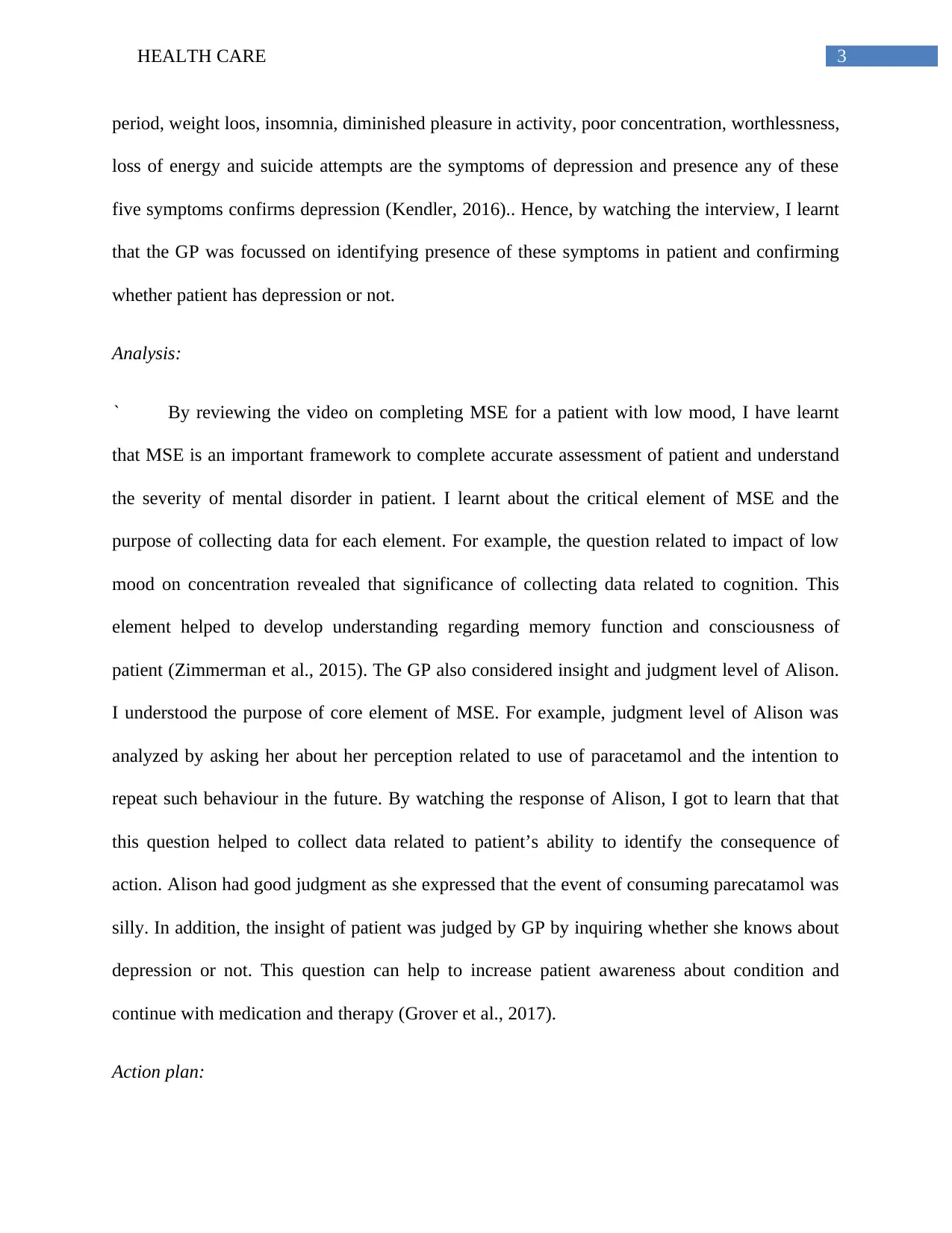
3HEALTH CARE
period, weight loos, insomnia, diminished pleasure in activity, poor concentration, worthlessness,
loss of energy and suicide attempts are the symptoms of depression and presence any of these
five symptoms confirms depression (Kendler, 2016).. Hence, by watching the interview, I learnt
that the GP was focussed on identifying presence of these symptoms in patient and confirming
whether patient has depression or not.
Analysis:
` By reviewing the video on completing MSE for a patient with low mood, I have learnt
that MSE is an important framework to complete accurate assessment of patient and understand
the severity of mental disorder in patient. I learnt about the critical element of MSE and the
purpose of collecting data for each element. For example, the question related to impact of low
mood on concentration revealed that significance of collecting data related to cognition. This
element helped to develop understanding regarding memory function and consciousness of
patient (Zimmerman et al., 2015). The GP also considered insight and judgment level of Alison.
I understood the purpose of core element of MSE. For example, judgment level of Alison was
analyzed by asking her about her perception related to use of paracetamol and the intention to
repeat such behaviour in the future. By watching the response of Alison, I got to learn that that
this question helped to collect data related to patient’s ability to identify the consequence of
action. Alison had good judgment as she expressed that the event of consuming parecatamol was
silly. In addition, the insight of patient was judged by GP by inquiring whether she knows about
depression or not. This question can help to increase patient awareness about condition and
continue with medication and therapy (Grover et al., 2017).
Action plan:
period, weight loos, insomnia, diminished pleasure in activity, poor concentration, worthlessness,
loss of energy and suicide attempts are the symptoms of depression and presence any of these
five symptoms confirms depression (Kendler, 2016).. Hence, by watching the interview, I learnt
that the GP was focussed on identifying presence of these symptoms in patient and confirming
whether patient has depression or not.
Analysis:
` By reviewing the video on completing MSE for a patient with low mood, I have learnt
that MSE is an important framework to complete accurate assessment of patient and understand
the severity of mental disorder in patient. I learnt about the critical element of MSE and the
purpose of collecting data for each element. For example, the question related to impact of low
mood on concentration revealed that significance of collecting data related to cognition. This
element helped to develop understanding regarding memory function and consciousness of
patient (Zimmerman et al., 2015). The GP also considered insight and judgment level of Alison.
I understood the purpose of core element of MSE. For example, judgment level of Alison was
analyzed by asking her about her perception related to use of paracetamol and the intention to
repeat such behaviour in the future. By watching the response of Alison, I got to learn that that
this question helped to collect data related to patient’s ability to identify the consequence of
action. Alison had good judgment as she expressed that the event of consuming parecatamol was
silly. In addition, the insight of patient was judged by GP by inquiring whether she knows about
depression or not. This question can help to increase patient awareness about condition and
continue with medication and therapy (Grover et al., 2017).
Action plan:
Paraphrase This Document
Need a fresh take? Get an instant paraphrase of this document with our AI Paraphraser
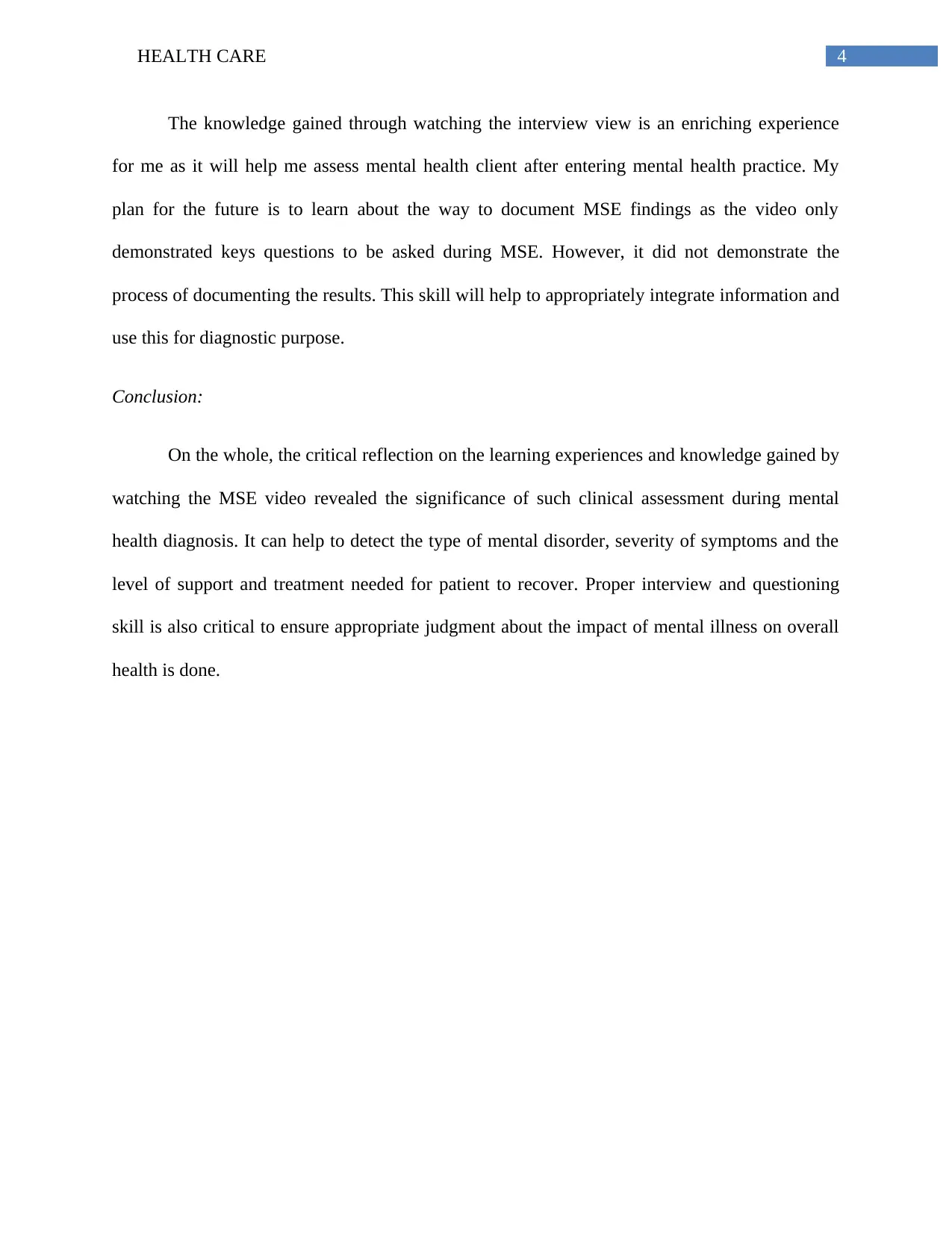
4HEALTH CARE
The knowledge gained through watching the interview view is an enriching experience
for me as it will help me assess mental health client after entering mental health practice. My
plan for the future is to learn about the way to document MSE findings as the video only
demonstrated keys questions to be asked during MSE. However, it did not demonstrate the
process of documenting the results. This skill will help to appropriately integrate information and
use this for diagnostic purpose.
Conclusion:
On the whole, the critical reflection on the learning experiences and knowledge gained by
watching the MSE video revealed the significance of such clinical assessment during mental
health diagnosis. It can help to detect the type of mental disorder, severity of symptoms and the
level of support and treatment needed for patient to recover. Proper interview and questioning
skill is also critical to ensure appropriate judgment about the impact of mental illness on overall
health is done.
The knowledge gained through watching the interview view is an enriching experience
for me as it will help me assess mental health client after entering mental health practice. My
plan for the future is to learn about the way to document MSE findings as the video only
demonstrated keys questions to be asked during MSE. However, it did not demonstrate the
process of documenting the results. This skill will help to appropriately integrate information and
use this for diagnostic purpose.
Conclusion:
On the whole, the critical reflection on the learning experiences and knowledge gained by
watching the MSE video revealed the significance of such clinical assessment during mental
health diagnosis. It can help to detect the type of mental disorder, severity of symptoms and the
level of support and treatment needed for patient to recover. Proper interview and questioning
skill is also critical to ensure appropriate judgment about the impact of mental illness on overall
health is done.
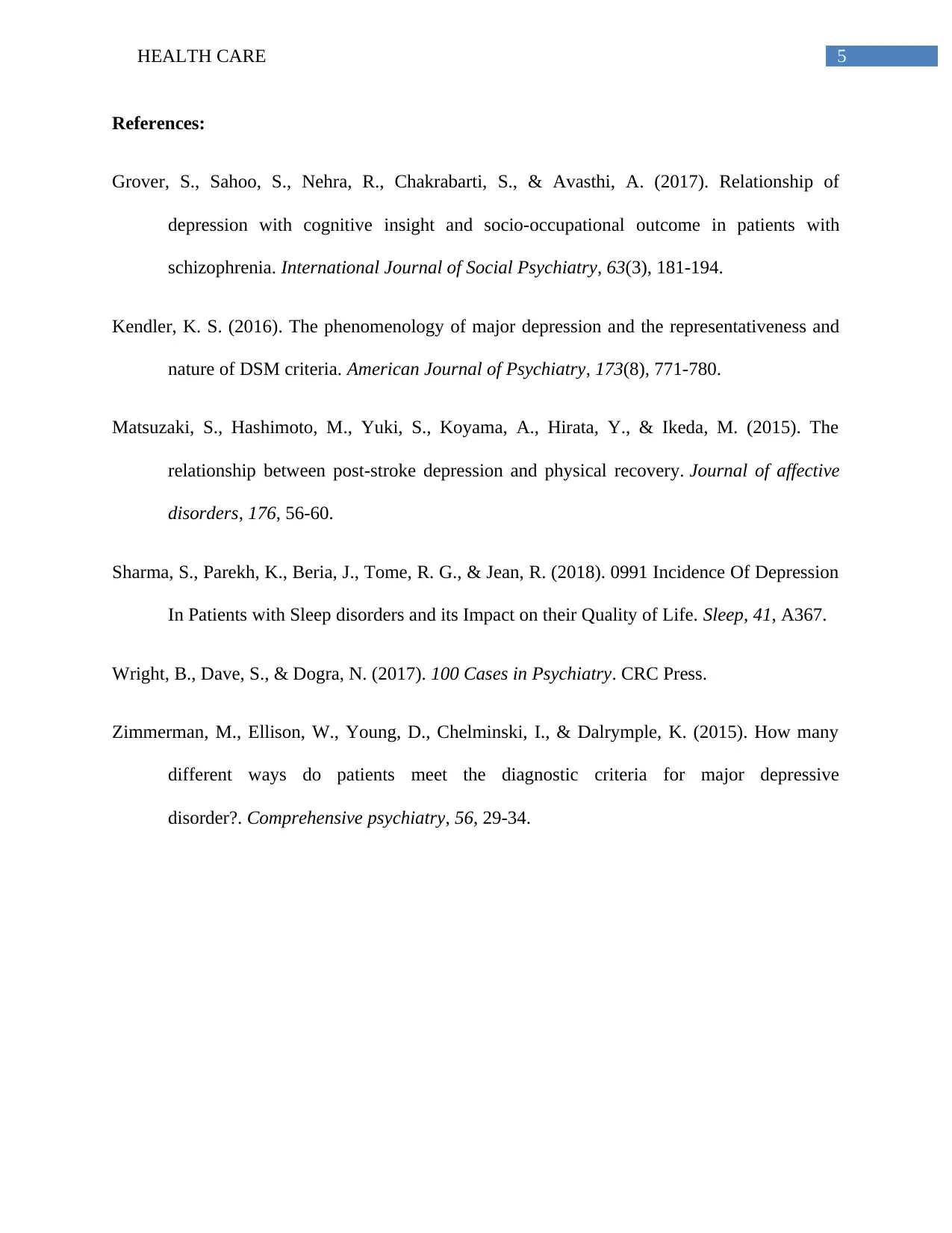
5HEALTH CARE
References:
Grover, S., Sahoo, S., Nehra, R., Chakrabarti, S., & Avasthi, A. (2017). Relationship of
depression with cognitive insight and socio-occupational outcome in patients with
schizophrenia. International Journal of Social Psychiatry, 63(3), 181-194.
Kendler, K. S. (2016). The phenomenology of major depression and the representativeness and
nature of DSM criteria. American Journal of Psychiatry, 173(8), 771-780.
Matsuzaki, S., Hashimoto, M., Yuki, S., Koyama, A., Hirata, Y., & Ikeda, M. (2015). The
relationship between post-stroke depression and physical recovery. Journal of affective
disorders, 176, 56-60.
Sharma, S., Parekh, K., Beria, J., Tome, R. G., & Jean, R. (2018). 0991 Incidence Of Depression
In Patients with Sleep disorders and its Impact on their Quality of Life. Sleep, 41, A367.
Wright, B., Dave, S., & Dogra, N. (2017). 100 Cases in Psychiatry. CRC Press.
Zimmerman, M., Ellison, W., Young, D., Chelminski, I., & Dalrymple, K. (2015). How many
different ways do patients meet the diagnostic criteria for major depressive
disorder?. Comprehensive psychiatry, 56, 29-34.
References:
Grover, S., Sahoo, S., Nehra, R., Chakrabarti, S., & Avasthi, A. (2017). Relationship of
depression with cognitive insight and socio-occupational outcome in patients with
schizophrenia. International Journal of Social Psychiatry, 63(3), 181-194.
Kendler, K. S. (2016). The phenomenology of major depression and the representativeness and
nature of DSM criteria. American Journal of Psychiatry, 173(8), 771-780.
Matsuzaki, S., Hashimoto, M., Yuki, S., Koyama, A., Hirata, Y., & Ikeda, M. (2015). The
relationship between post-stroke depression and physical recovery. Journal of affective
disorders, 176, 56-60.
Sharma, S., Parekh, K., Beria, J., Tome, R. G., & Jean, R. (2018). 0991 Incidence Of Depression
In Patients with Sleep disorders and its Impact on their Quality of Life. Sleep, 41, A367.
Wright, B., Dave, S., & Dogra, N. (2017). 100 Cases in Psychiatry. CRC Press.
Zimmerman, M., Ellison, W., Young, D., Chelminski, I., & Dalrymple, K. (2015). How many
different ways do patients meet the diagnostic criteria for major depressive
disorder?. Comprehensive psychiatry, 56, 29-34.
⊘ This is a preview!⊘
Do you want full access?
Subscribe today to unlock all pages.

Trusted by 1+ million students worldwide
1 out of 6
Related Documents
Your All-in-One AI-Powered Toolkit for Academic Success.
+13062052269
info@desklib.com
Available 24*7 on WhatsApp / Email
![[object Object]](/_next/static/media/star-bottom.7253800d.svg)
Unlock your academic potential
Copyright © 2020–2026 A2Z Services. All Rights Reserved. Developed and managed by ZUCOL.





